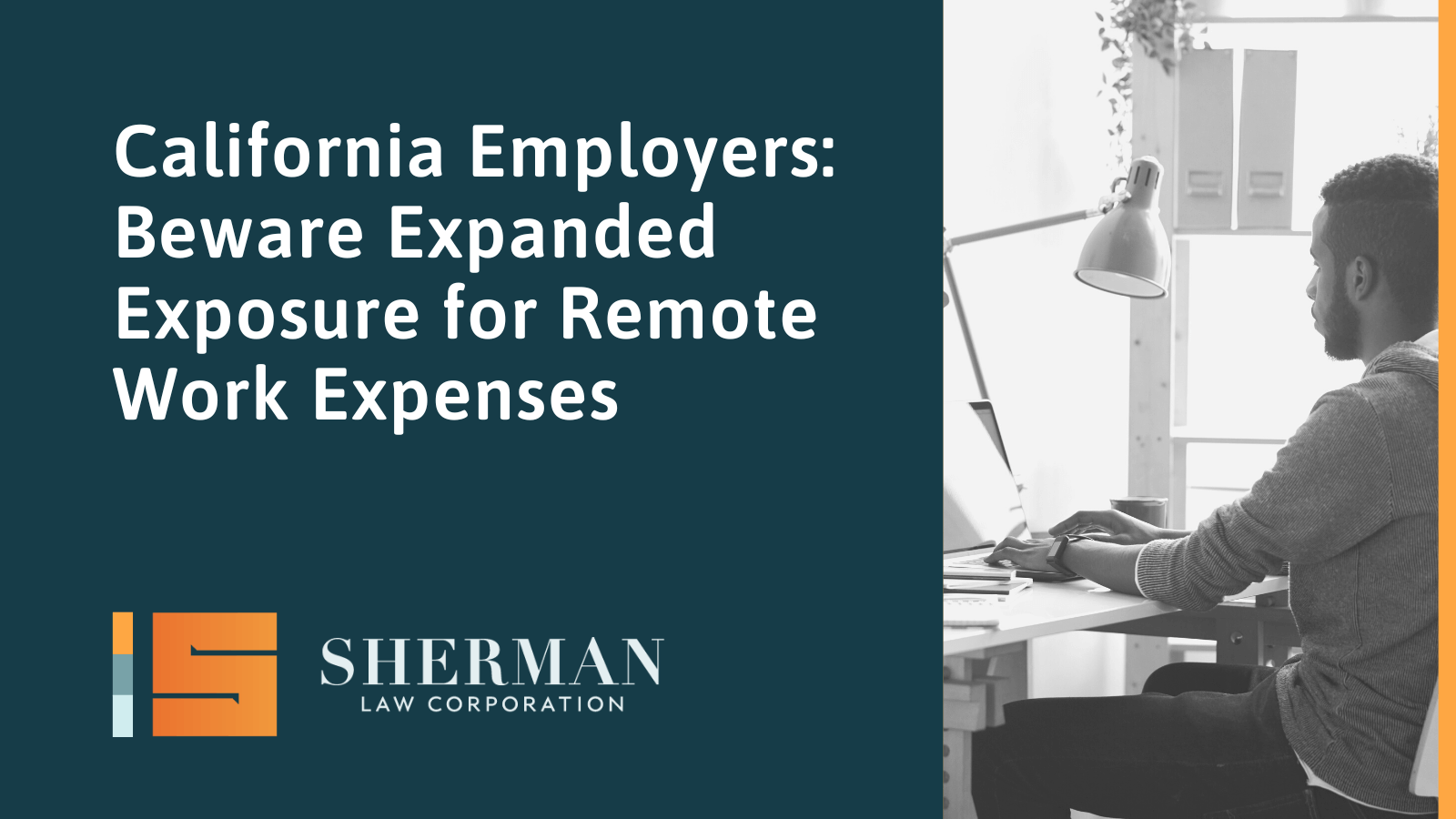
Since COVID, California has seen an increase in employees seeking reimbursement for costs they have incurred since working from home. This includes, higher utility costs or loss of extra income from renting out their home office spaces.
As many California businesses continue to have their employees work from home, reimbursement requirements under California law is a new breeding ground for lawsuits.
Labor Code Section 2802
California Labor Code Section 2802 requires all employers to reimburse for “all necessary expenditures or losses” for their employers. If they are not fully compensated, this Labor Code section allows for recovery of attorneys’ fees.
What Costs are Typically Reimbursed?
Basic costs subject to reimbursement varies according to the job and company, but they typically include the following costs that are expended for business use:
- Internet costs
- Phone costs
- Computer costs
- Physical space for working from home
Employers typically satisfy this obligation by paying a stipend that covers a “reasonable percentage” of these estimated costs devoted to business use. To date, the only successful reimbursement lawsuits in California have been recovery of the basic costs mentioned above.
Now we are seeing employees attempt to expand reimbursements. A court could find that furniture and equipment costs should be covered if the employee was required to purchase them solely for working from home.
Employees have also sought reimbursement for on-site perks that they used to receive before working from home, such as free meals. It’s unclear how the courts will respond to these claims yet.
How Can Employers Defend Themselves Against Suits for Work-From-Home Related Expenses?
A recent case gives us insight on how courts will rule.
In Williams v. Amazon.com Services LLC, Amazon filed a Motion to Dismiss an employee’s lawsuit in the Northern District of California asserting the two following arguments:
- Amazon claimed that adhering to government-issued stay-at-home orders absolved them of liability;
- Amazon claimed that the employee did not submit reimbursement requests to Amazon, which meant they could not know of the incurred work-related expenses.
The Court denied Amazon’s Motion on the basis that the employee sufficiently pled his claim under Section 2802 holding that Amazon’s expectation for the employee to work from home after the stay-at-home orders were imposed were sufficient to establish Amazon’s liability.
The Court’s analysis of Amazon’s second argument provides guidance on how to determine an employer’s “reasonable” expectations. The Court considered both Amazon’s status as a tech company and Williams’ position as a senior software development engineer (which entailed duties such as writing design documents for software systems and being on-call for production system) to determine that Williams’ duties “plausibly requires the use of physical space, internet, and electricity.”
Therefore, “Amazon, a major tech company, surely knew or at the very least had reason to know” that its software engineers incurred “basic costs” related to their work while they worked from home and actual notice of the costs was not required
This means that California employers who adhered to state and/or county mandates are not likely to be shielded from liability for these types of reimbursements – even though employers did not cause the shift to remote work.
How to Determine Basic Costs
Across a number of cases, employees’ most common “basic costs” include reliable access to the Internet, a phone, and a computer. Importantly, prior to the pandemic, courts have held that employers need only reimburse a “reasonable percentage” of an employee’s use of a personal phone or Internet costs.
Beyond that, the “physical space” requirement as referenced in Williams v. Amazon is more difficult to define. Some of the newly filed lawsuits are now demanding payment for the potential revenue employees could have collected had they rented out their home office instead of using it for work.
In these cases, employees claim that they lost out on potential revenue of renting out the rooms they used as offices, even where there is no actual rental agreement or even a prospective tenant. There is no published authority supporting an award of such expenses in California, and we believe it is unlikely that a court would find that such theoretical expenses are compensable.
In other cases, employees have claimed that they were required to purchase office furniture and equipment to work remotely. In these lawsuits, the employee is likely to be successful if the employee can show that the furniture/equipment was necessary as a direct consequence of the employee’s duties.
The date of purchase of the furniture/equipment may be relevant because if the employee purchased the furniture before being approved to work from home, the employer has a strong argument that the furniture/equipment purchase was not a “necessary expenditure or loss incurred by the employee in direct consequence of the discharge of his or her duties.” Labor Code Section 2802.
Prior to the pandemic, some employers, particularly tech-based startups, offered on-site perks such as free meals and dry-cleaning. Some disgruntled employees have since complained about the cost of preparing or purchasing their own meals while working remotely and are now seeking reimbursement for these costs as well.
By their nature, perks are not necessary for employees to discharge their duties, so we believe it may be difficult for employees to successfully recover these costs, but in California, one never knows what the courts will do.
Contact the Sherman Law Corporation for more information
The best way for employers to protect themselves against reimbursement claims is to make sure that all employees have their jobs and work-from-home arrangements explicitly defined with all necessary expenses identified explicitly.
Contact our California employment firm today to make sure your policies are up-to-date and that your company is protected against these types of claims.




